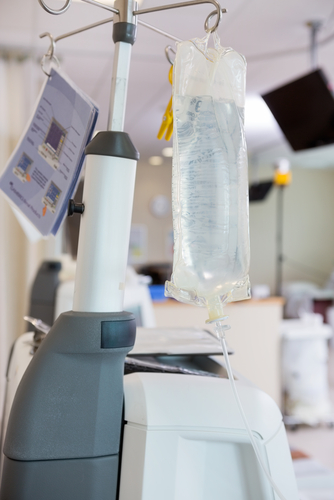NT-proBNP Biomarker Remains Predictive for Pulmonary Hypertension Despite Renal Dysfunction

 Clinicians are constantly in need of biomarkers that can be used to non-invasively predict disease status of patients. In the case of pulmonary hypertension, one promising predictor is the N-terminal fragment of the pro-hormone for brain natriuretic peptide: N-terminal pro-brain natriuretic peptide (NT-proBNP). Levels of NT-proBNP are elevated after ventricular impairment, which is analogous to the right ventricular failure in pulmonary hypertension.
Clinicians are constantly in need of biomarkers that can be used to non-invasively predict disease status of patients. In the case of pulmonary hypertension, one promising predictor is the N-terminal fragment of the pro-hormone for brain natriuretic peptide: N-terminal pro-brain natriuretic peptide (NT-proBNP). Levels of NT-proBNP are elevated after ventricular impairment, which is analogous to the right ventricular failure in pulmonary hypertension.
Despite the promise of NT-proBNP as a biomarker, concomitant renal dysfunction seen in 20% of pulmonary hypertension patients threatens to weaken NT-proBNP’s predictive power. Impaired renal function leads to a decreased glomerular filtration rate (GFR, an indicator of kidney filtering capacity) and an accumulation of NT-proBNP, which may complicate interpretation of bio-marker test readouts.
[adrotate group=”4″]
Rather than let NT-proBNP slip away as a bio-marker that can be used to predict pulmonary hypertension in renal dysfunction patients, a group of researchers, who were under the supervision of principal investigator Dr. Hans Klose from the University Medical Center Hamburg-Eppendorf in Germany, tested the feasibility of using NT-proBNP levels to assess disease severity and predict outcome in 155 pre-capillary pulmonary hypertension patients, 40 of whom had renal insufficiency. The group hypothesized NT-proBNP can be used as a bio-marker despite concomitant renal dysfunction and published their findings in PLoS ONE.
After collecting both retrospective and present data and following up with patients, the authors were able to support their hypothesis. In agreement with previous literature results, the patients’ serum levels of NT-proBNP inversely correlated with GFR and were significantly higher in patients with renal insufficiency. Regardless of renal function, NT-proBNP levels also correlated with hemodynamic parameters. At patient follow-ups, which occurred after a mean time of 20.6 months, 46% of patients showed clinical worsening of their pulmonary hypertension. When the retrospective NT-proBNP values were used to predict this worsening, the researchers needed to define a higher cutoff value in renal insufficiency patients (1660 ng/L, sensitivity 68%, specificity 73%) as compared to patients with normal renal function (1292 ng/L, sensitivity 50%, specificity 83%). Patients with NT-proBNP levels higher than these cutoffs were 4.8 times more likely to have clinical worsening. The authors concluded that NT-proBNP can be used to predict pre-capillary pulmonary hypertension, but renal dysfunction must be taken into account.
[adrotate group=”3″]







